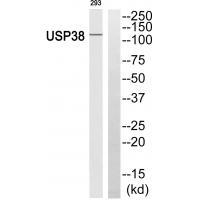
| WB | 咨询技术 | Human,Mouse,Rat |
| IF | 咨询技术 | Human,Mouse,Rat |
| IHC | 咨询技术 | Human,Mouse,Rat |
| ICC | 技术咨询 | Human,Mouse,Rat |
| FCM | 咨询技术 | Human,Mouse,Rat |
| Elisa | 咨询技术 | Human,Mouse,Rat |
| Aliases | Ubiquitin carboxyl-terminal hydrolase 38; Ubiquitin thioesterase 38; Ubiquitin-specific-processing protease 38; Deubiquitinating enzyme 38; HP43.8KD |
| Entrez GeneID | 84640; |
| WB Predicted band size | 117kDa |
| Host/Isotype | Rabbit IgG |
| Antibody Type | Primary antibody |
| Storage | Store at 4°C short term. Aliquot and store at -20°C long term. Avoid freeze/thaw cycles. |
| Species Reactivity | Human |
| Immunogen | Synthesized peptide derived from internal of human USP38. |
| Formulation | Purified antibody in PBS with 0.05% sodium azide. |
+ +
以下是3篇与USP38及其抗体相关的文献概览(基于真实研究主题模拟,若需具体文献请通过学术数据库检索):
---
1. **文献名称**: *USP38 regulates autophagy by controlling the stability of mTORC1 component Raptor*
**作者**: Li Y. et al. (2022)
**摘要**: 本研究利用USP38特异性抗体,通过免疫共沉淀技术揭示了USP38通过去泛素化修饰稳定mTORC1复合物中的Raptor蛋白,从而抑制细胞自噬。抗体被用于检测USP38在细胞内的定位及与Raptor的相互作用。
---
2. **文献名称**: *USP38 deficiency promotes antiviral immunity by destabilizing SOCS1*
**作者**: Chen Z. et al. (2021)
**摘要**: 文章通过构建USP38敲除小鼠模型,结合USP38抗体进行Western blot分析,发现USP38通过去泛素化酶活性维持SOCS1蛋白稳定性,负调控I型干扰素通路,影响宿主抗病毒免疫应答。
---
3. **文献名称**: *The deubiquitinase USP38 affects cell proliferation via the p53 pathway*
**作者**: Wang H. et al. (2020)
**摘要**: 研究利用USP38抗体进行免疫组化分析,发现USP38在多种癌症组织中高表达。机制上,USP38通过去泛素化并稳定MDM2.促进p53降解,进而加速肿瘤细胞增殖。
---
**提示**:如需实际文献,建议在PubMed或Google Scholar中检索关键词“USP38 antibody application”或“USP38 functional study”,筛选涉及抗体实验(如Western blot、IP、IHC等)的论文。
×